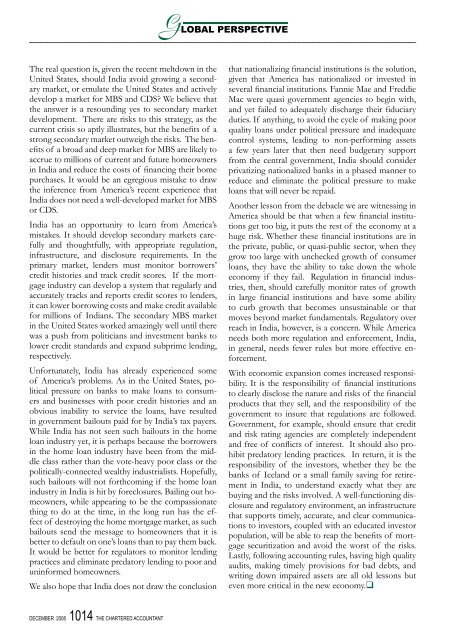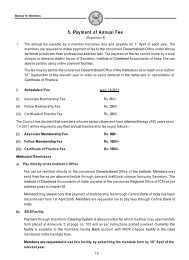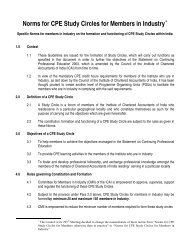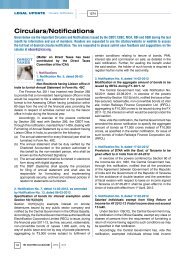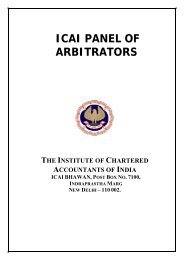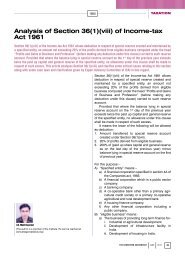The Chartered Accountant
The Chartered Accountant
The Chartered Accountant
You also want an ePaper? Increase the reach of your titles
YUMPU automatically turns print PDFs into web optimized ePapers that Google loves.
<strong>The</strong> real question is, given the recent meltdown in the<br />
United States, should India avoid growing a secondary<br />
market, or emulate the United States and actively<br />
develop a market for MBS and CDS? We believe that<br />
the answer is a resounding yes to secondary market<br />
development. <strong>The</strong>re are risks to this strategy, as the<br />
current crisis so aptly illustrates, but the benefits of a<br />
strong secondary market outweigh the risks. <strong>The</strong> benefits<br />
of a broad and deep market for MBS are likely to<br />
accrue to millions of current and future homeowners<br />
in India and reduce the costs of financing their home<br />
purchases. It would be an egregious mistake to draw<br />
the inference from America’s recent experience that<br />
India does not need a well-developed market for MBS<br />
or CDS.<br />
India has an opportunity to learn from America’s<br />
mistakes. It should develop secondary markets carefully<br />
and thoughtfully, with appropriate regulation,<br />
infrastructure, and disclosure requirements. In the<br />
primary market, lenders must monitor borrowers’<br />
credit histories and track credit scores. If the mortgage<br />
industry can develop a system that regularly and<br />
accurately tracks and reports credit scores to lenders,<br />
it can lower borrowing costs and make credit available<br />
for millions of Indians. <strong>The</strong> secondary MBS market<br />
in the United States worked amazingly well until there<br />
was a push from politicians and investment banks to<br />
lower credit standards and expand subprime lending,<br />
respectively.<br />
Unfortunately, India has already experienced some<br />
of America’s problems. As in the United States, political<br />
pressure on banks to make loans to consumers<br />
and businesses with poor credit histories and an<br />
obvious inability to service the loans, have resulted<br />
in government bailouts paid for by India’s tax payers.<br />
While India has not seen such bailouts in the home<br />
loan industry yet, it is perhaps because the borrowers<br />
in the home loan industry have been from the middle<br />
class rather than the vote-heavy poor class or the<br />
politically-connected wealthy industrialists. Hopefully,<br />
such bailouts will not forthcoming if the home loan<br />
industry in India is hit by foreclosures. Bailing out homeowners,<br />
while appearing to be the compassionate<br />
thing to do at the time, in the long run has the effect<br />
of destroying the home mortgage market, as such<br />
bailouts send the message to homeowners that it is<br />
better to default on one’s loans than to pay them back.<br />
It would be better for regulators to monitor lending<br />
practices and eliminate predatory lending to poor and<br />
uninformed homeowners.<br />
We also hope that India does not draw the conclusion<br />
DECEMBER 2008 1014 THE CHARTERED ACCOUNTANT<br />
GLOBAL PERSPECTIVE<br />
that nationalizing financial institutions is the solution,<br />
given that America has nationalized or invested in<br />
several financial institutions. Fannie Mae and Freddie<br />
Mac were quasi government agencies to begin with,<br />
and yet failed to adequately discharge their fiduciary<br />
duties. If anything, to avoid the cycle of making poor<br />
quality loans under political pressure and inadequate<br />
control systems, leading to non-performing assets<br />
a few years later that then need budgetary support<br />
from the central government, India should consider<br />
privatizing nationalized banks in a phased manner to<br />
reduce and eliminate the political pressure to make<br />
loans that will never be repaid.<br />
Another lesson from the debacle we are witnessing in<br />
America should be that when a few financial institutions<br />
get too big, it puts the rest of the economy at a<br />
huge risk. Whether these financial institutions are in<br />
the private, public, or quasi-public sector, when they<br />
grow too large with unchecked growth of consumer<br />
loans, they have the ability to take down the whole<br />
economy if they fail. Regulation in financial industries,<br />
then, should carefully monitor rates of growth<br />
in large financial institutions and have some ability<br />
to curb growth that becomes unsustainable or that<br />
moves beyond market fundamentals. Regulatory over<br />
reach in India, however, is a concern. While America<br />
needs both more regulation and enforcement, India,<br />
in general, needs fewer rules but more effective enforcement.<br />
With economic expansion comes increased responsibility.<br />
It is the responsibility of financial institutions<br />
to clearly disclose the nature and risks of the financial<br />
products that they sell, and the responsibility of the<br />
government to insure that regulations are followed.<br />
Government, for example, should ensure that credit<br />
and risk rating agencies are completely independent<br />
and free of conflicts of interest. It should also prohibit<br />
predatory lending practices. In return, it is the<br />
responsibility of the investors, whether they be the<br />
banks of Iceland or a small family saving for retirement<br />
in India, to understand exactly what they are<br />
buying and the risks involved. A well-functioning disclosure<br />
and regulatory environment, an infrastructure<br />
that supports timely, accurate, and clear communications<br />
to investors, coupled with an educated investor<br />
population, will be able to reap the benefits of mortgage<br />
securitization and avoid the worst of the risks.<br />
Lastly, following accounting rules, having high quality<br />
audits, making timely provisions for bad debts, and<br />
writing down impaired assets are all old lessons but<br />
even more critical in the new economy.q


